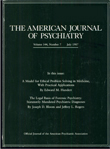Double-blind comparison of sertraline, imipramine, and placebo in the treatment of dysthymia: psychosocial outcomes
Abstract
OBJECTIVE: The purpose of this study was to determine the effects of antidepressant pharmacotherapy on mood symptoms and psychosocial outcomes in dysthymia. METHOD: In a multicenter, double-blind, parallel- group trial, 416 patients with a diagnosis of early-onset primary dysthymia (DSM-III-R) of at least 5 years' duration without concurrent major depression were randomly assigned to 12 weeks of acute-phase therapy with sertraline, imipramine, or placebo. The psychosocial outcome measures used in the study were the Global Assessment of Functioning Scale, the Social Adjustment Scale, the Longitudinal Interval Follow-up Evaluation psychosocial ratings, and the Quality of Life Enjoyment and Satisfaction Questionnaire. RESULTS: Sertraline and imipramine were significantly better than placebo in improving psychosocial outcomes as measured by the first three instruments. The Quality of Life Enjoyment and Satisfaction Questionnaire scores demonstrated significant improvements from baseline, and both active treatments produced significantly greater improvements than placebo. Significantly fewer patients discontinued sertraline (6.0%) than discontinued imipramine (18.4%) because of adverse events. CONCLUSIONS: Pharmacotherapy is an effective treatment for dysthymia in terms of psychosocial functioning as well as depressive symptoms, even when the dysthymia is long-standing.



